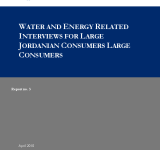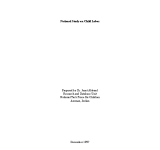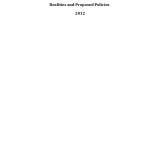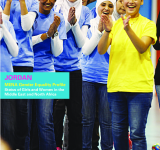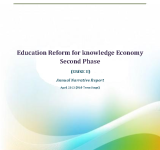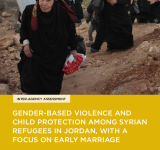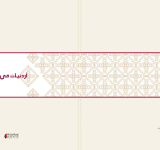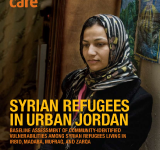The report aims to better understand and quantify the attitude and the levels of awareness amongst large consumers of water and energy;; and it presents the findings of the interviews conducted with a representative sample of large consumers to better understand trends and behaviors related to water and energy consumption. The research was conducted as part of the Jordan Public Action in Water;; Energy;; and Environment Project (PAP) under the Prosperity;; Livelihoods;; and Conserving Ecosystems (PLACE);; which aims to initiate and establish clear and identifiable behavioral changes amongst the Jordanian public and decision-makers. The study categorizes large consumers into a number of main sectors including hotel and restaurant sectors;; commercial sector;; hospitals;; government buildings and industrial sector;; and the field surveys were collected as a random sample of different industries;; state and commercial buildings. The research finds that the majority of large consumers neither monitor their water nor their energy consumptions via sub-metering scheme;; showing that the majority of large consumers are not able to accurately determine the areas within their establishments that are the most consuming. This finding identifies four major obstacles in implementing the water and energy saving practices including;; lack of awareness;; lack of incentive programs amongst employees;; higher prices for higher quality savings devices and lack of proper maintenance.
financial
This report analyzes the nature of child labor in Jordan. Child labor is defined as “the active participation of any child less than 16 years of age in any economic activity;; regardless of the type of work;; the employer;; the nature of the job;; or the activity.” This report examines the magnitude of child labor in Jordan based on the existing information and the collection of additional field data (both qualitative and quantitative) on the causes;; conditions;; and consequences of child labor. This report also aims to identify sub-populations of children most at risk to child labor;; investigate inadequacies in Jordanian laws and legislation with regards to child labor;; and examine vocational training programs and existing non-formal education programs for school drop-outs in relation to child labor. With regards to methodology;; information on child labor in Jordan was obtained through both primary and secondary sources;; including previous studies;; interviews;; and a field survey. After careful analysis;; this report makes a number of recommendations which aim to combat illegal of harmful child labor in Jordan.
This report was jointly prepared by the Jordanian National Commission for Women (JOHUD);; the Jordan Hashemite Fund for Human development/Regional Economic Empowerment of Women Project (REEWP) and the United Nations Population Fund (UNFPA). The report discusses the right to inheritance and debates a number of issues including the provisions concerning women's rights to inheritance in Islam;; the legal framework of the women's rights to inheritance in Jordan;; the guarantees of these rights and finally the reality of the women's right to inheritance in Jordan. The report concludes with recommendations.
This report is designed to trace the status of girls and women in Jordan. The main themes are: civic rights;; legal rights;; women political participation;; education;; participation in the labour market;; health;; reproductive health;; child protection;; domestic violence;; HIV/AIDS and treaties.
The second phase of the Program Education Reform for the Knowledge Economy Program (ERfKE II) continues to build on the achievements of the first phase and follow the same implementation arrangements that have proven to be successful in (ERfKE I);; and in the same time;; focuses on schools as the locus of change as well as on the need to enhance capacity building at the central and field levels. The development objective of (ERfKE II) is to provide students enrolled in pre-tertiary education institutions in Jordan with increased levels of skills to participate in knowledge economy. Also the Mid-Term review highlighted the concrete progress achieved by (ERfKE II) in several key areas related to policy development;; quality of education interventions and school construction;; and identified the key issues as a summary of the overall progress that will be tackled and addressed during the remaining stage of implementation.
The report aims to address the particular needs and cultural dynamics of Syrian refugees residing in Jordan;; especially with regards gender-based violence and child protection issues. It presents a comprehensive range of perspectives from urban Syrian refugees and local Jordanian decision makers in government;; community-based organizations and the religious and education sectors. The assessment of this report is based on data collected through three methodologies including questionnaire survey to refugees outside the Za’atari refugee camp;; focus group discussions in regions across Jordan and in-depth interviews. Key findings of the report are 1. The rates of early marriage are high;; 2. A significant percentage of children contribute to the household’s income and 3. Restrictions on women and girls’ mobility constrain their participation in social and economic activities and access to basic services. The report recommends measures to prevent acts of sexual exploitation and abuse and ensure the needs of the most vulnerable members of the Syrian refugee population in the cities.
تهدف الدراسة الى التعرف على مشاركة المرأة في المجالس البلديه في الأردن. باستخدام المنهج النوعي;; ولتحقيق اهداف الدراسة تم سحب عينة قصدية من البلديات بلغت 11 بلدية;; تمت مقابلة 9 رؤساء بلدية و15 امرأة وعقد ٥ مجموعات بؤرية مكونة من عضوات المجالس البلدية ;; و7 مجموعات بؤرية مكونة من موظفي وموظفات المجالس البلدية. وخرجت الدراسه بنتائج أهمها أن المرأة تعتبر غير فاعلة في المجلس البلدي;; وذلك يعود الى عدة اسباب أهمها: تهميش رئيس واعضاء المجلس البلدي لهن;; وعدم معرفتهن بمهام عضو المجلس البلدي;;اضافة إلى التنافس العدائي بينهن. وكما قدمت الدراسة مجموعة من التوصيات موجهة الى الحكومة او منظمات المجتمع المدني والمنظمات الدوليه وذلك لتعظيم دور عضوات المجالس البلدية.
This report is a baseline assessment of community-identified vulnerabilities among Syrian refugees living in Amman;; Irbid;; Madaba;; Mufraq;; and Zarqa. The purpose of this report is to identify urban Syrian refugees’ current coping mechanisms and any gaps in services available to Syrian refugees in Jordan. The research methodology is both qualitative and participatory in design;; drawing from the UNHCR tool for Participatory Assessment in Operations. This report presents only the data from household interviews;; baseline assessment;; and the follow-up focus groups conducted with community members. The number of households surveyed was 240;; with a total number of 1;;476 household members and 89 focus group participants representing 534 household members. The report proposed general recommendations and interventions to deal with the main highlighted challenges (cash assistance;; strengthening community links;; vocational training;; physical activities ...etc).
